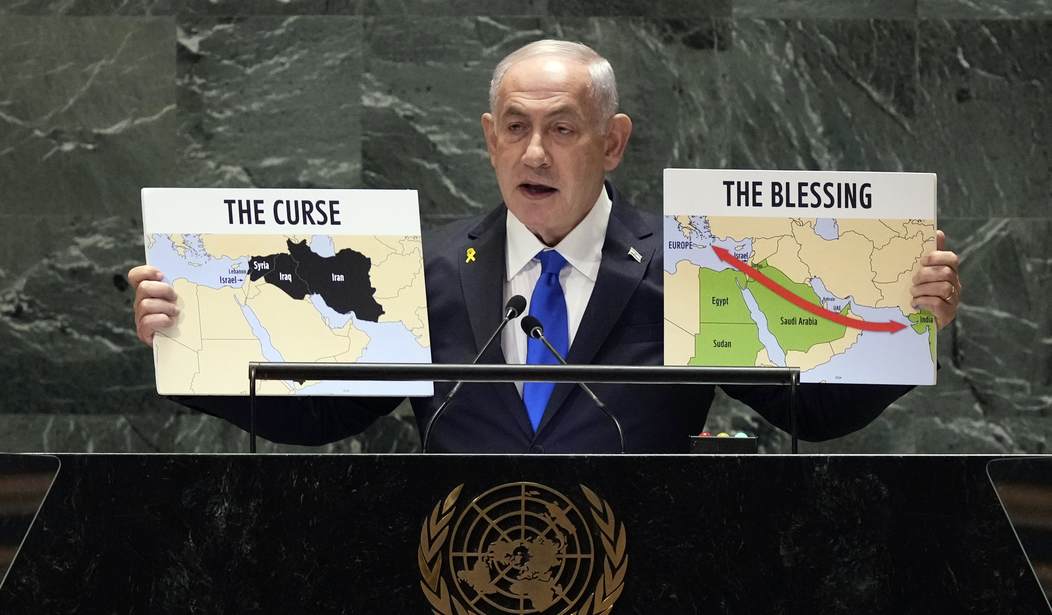It's on. Almost a month after Iran attacked Israel with an estimated 200 ballistic missiles, the Israelis have begun their promised retaliatory strikes. Unlike the Iranian attack, the Israelis have apparently hit and destroyed several strategic targets, and the attack continues to unfold:
In a statement, the IDF says it is carrying out “precise strikes” on Iranian military targets, in response to “months of continuous attacks from the regime in Iran against the State of Israel.”
“The regime in Iran and its proxies in the region have been relentlessly attacking Israel since October 7th – on seven fronts – including direct attacks from Iranian soil,” the military says.
“Like every other sovereign country in the world, the State of Israel has the right and the duty to respond,” the statement continues.
"Precise strikes" has both a military and political meaning. Iran's ballistic missile attack didn't have much precision; the Iranians basically lobbed them at Israel in general and hoped to do damage wherever the missiles hit. The only fatality turned out to be a Palestinian in the West Bank, thanks in large part to the Israeli missile defenses and the combined US-Israeli forces.
Militarily, that is a message to the US. The Israelis want everyone to know that they are not conducting the same kind of indiscriminate missile attacks used by Iran, or for that matter, Hamas or Hezbollah. No doubt the Biden administration demanded both precision and careful choice of targets as part of its agreement to back Israel's action.
Both points are getting made in real time. The IDF seems to have easily penetrated Iran's air defenses and are hitting specific targets in the Iranian capital. NBC reports from Arab sources that the IDF has already hit an IRGC barracks and a weapons depot, but there are quite a few explosions around Tehran at the moment. And not just Tehran either, but at Isfahan too -- the site of Iran's nuclear program:
Reza Rashidpour, a prominent journalist in Iran, said five large explosions were heard in Tehran within about 10 seconds. He said Iranian Air Force jets had taken off in the western part of the country. ...
Iranians reported hearing sounds of explosions in Isfahan, Mashhad and Kurdistan Province. Explosion sounds in Tehran have ended but a lingering anxiety remains, several residents said.
According to the Jerusalem Post, the IDF hit the headquarters of the IRGC and the airport in Tehran:
Reports of explosions at the Imam Khomeini International Airport in the Iranian capital were also received.
Arab media reported that Israel attacked the location of the headquarters of the Islamic Revolutionary Guards Corps in Iran.
There were no planes flying over Syria or northern Iraq during the time of the suspected attack. Iran closed its airspace following the attack, according to Maariv.
Syrian TV reported explosions in and around Damascus too, apparently part of the retaliation from Israel.
So far we don't have much information on the precise targets of the strikes, other than the references above. Interestingly, though, Iran told other Arab countries that they may choose not to respond as long as Israel doesn't attack its energy sector:
Ahead of the strikes, Iran told Arab officials that Tehran doesn't want a wider war and wouldn't seek to retaliate to strikes against military and government targets.
Should Israel attack its strategic oil and nuclear sites, which Israel has said it won't do, Iran has told Arab neighbors it would be forced to respond.
They may not have much choice in the matter. A significant strike on the capital in any form will generate anger against the regime, and the IRGC could have its hands full in preventing an uprising that could threaten the mullahcracy. Any precision demonstrated in these attacks will not be lost on the Tehran population; they will know that the Israelis could have done worse, and that the IRGC wouldn't have been able to prevent it.
Of course, the report of explosions in Isfahan may indicate that the Israelis sent a message about their next escalation. Stand by for more updates.
Update: The Israelis say they are not hitting energy targets. This time.
Israel’s retaliatory targets do not include energy infrastructure or nuclear facilities, an Israeli official told ABC News.
— ABC News (@ABC) October 26, 2024
Some "strong" explosions have been heard around Tehran, though the cause of the sounds is still unclear, Iranian state TV said. https://t.co/0nAmKVOPOU
The White House is telling media through leaks that the US was not involved in this operation, but that they were informed of the attack before it launched and it will keep its present force level to deter Iran from responding.
Update: The IDF is simultaneously hitting Beirut's southern suburbs. That is Hezbollah's power base, although it's not clear yet what the specific targets are in this strike.
Update: A second wave of attacks have begun, this time targeting military bases near Shiraz in southern Iran. The first wave appeared to target military installations around Tehran.
Update: The Iranians are claiming that their air defenses intercepted the Israeli attacks, but the IDF says there were "zero interceptions." The Dallas Cowboys will be jealous. The Syrians are also claiming to have shot down Israeli missiles, but I haven't seen a specific response yet to that claim.
Update: Iranian media are sharply downplaying the strikes. The NYT thinks it's a sign that they won't escalate again, but it may also be an attempt to keep the people of Tehran from taking advantage of the situation to seize power. They did close their airspace, however, which means they're looking for more strikes. They had hesitated to make that move at first.








Join the conversation as a VIP Member